Related Research Articles
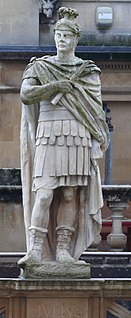
Gnaeus Julius Agricola was a Roman general and politician responsible for much of the Roman conquest of Britain. Born to a political family of senatorial rank, Agricola began his military career as a military tribune under Governor Gaius Suetonius Paulinus. In his subsequent career, he served in a variety of political positions in Rome. In 64, he was appointed quaestor in Asia province. Two years later, he was appointed Plebeian Tribune, and in 68, he was made praetor. During the Year of the Four Emperors in 69, he supported Vespasian, legate of Syria, in his bid for the throne.

Guerrilla warfare is a form of irregular warfare in which small groups of combatants, such as paramilitary personnel, armed civilians, or irregulars, use military tactics including ambushes, sabotage, raids, petty warfare, hit-and-run tactics, and mobility, to fight a larger and less-mobile traditional military.
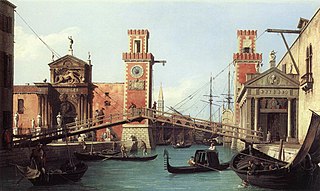
An arsenal is a place where arms and ammunition are made, maintained and repaired, stored, or issued, in any combination, whether privately or publicly owned. Arsenal and armoury or armory are mostly regarded as synonyms, although subtle differences in usage exist.

An aide-de-camp is a personal assistant or secretary to a person of high rank, usually a senior military, police or government officer, or to a member of a royal family or a head of state.

Materiel or matériel refers to supplies, equipment, and weapons in military supply-chain management, and typically supplies and equipment in a commercial supply chain context.

A portable or mobile toilet is any type of toilet that can be moved around, some by one person, some by mechanical equipment such as a truck and crane. Most types do not require any pre-existing services or infrastructure, such as sewerage, but are completely self-contained. The portable toilet is used in a variety of situations, for example in urban slums of developing countries, at festivals, for camping, on boats, on construction sites, film locations, and large outdoor gatherings where there are no other facilities. Most portable toilets are unisex single units with privacy ensured by a simple lock on the door. Some portable toilets are small molded plastic or fiberglass portable rooms with a lockable door and a receptacle to catch the human excreta in a container.
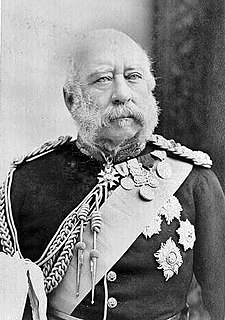
The Commander-in-Chief of the Forces, later Commander-in-Chief, British Army, or just the Commander-in-Chief (C-in-C), was (intermittently) the professional head of the English Army from 1660 to 1707 and of the British Army from 1707 until 1904. In 1904 the office was replaced with the creation of the Army Council and the appointment of Chief of the General Staff.
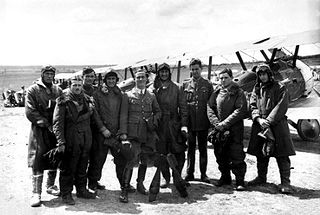
The Australian Flying Corps (AFC) was the branch of the Australian Army responsible for operating aircraft during World War I, and the forerunner of the Royal Australian Air Force (RAAF). The AFC was established in 1912, though it was not until 1914 that it began flight training.

The Women's Army Auxiliary Corps (WAAC), known as Queen Mary's Army Auxiliary Corps (QMAAC) from 9 April 1918, was the women's corps of the British Army during and immediately after the First World War. It was established in February 1917 and disbanded on 27 September 1921.

Camp followers are civilians who follow armies. There are two common types of camp followers; first, the wives and children of soldiers, who follow their spouse or parent's army from place to place; the second type of camp followers have historically been informal army service providers, servicing the needs of encamped soldiers, in particular selling goods or services that the military does not supply—these have included cooking, laundering, liquor, nursing, sexual services and sutlery.

The Battle of the Great Plains was a battle between a Roman army commanded by Scipio Africanus and a combined Carthaginian-Numidian army late in the Second Punic War. It was fought on the plains south of Bulla Regia around the upper Bagradas River. The African campaign of Scipio was designed as a diversionary tactic by Rome to disrupt Hannibal's attack on Italy. By defeating the Carthaginians, Scipio Africanus caused Hannibal to leave Italy and return to Africa, where he was later defeated at Zama.
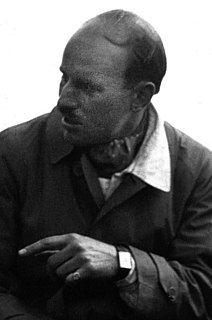
John Stuart Hindmarsh was an English racecar driver and aviator.
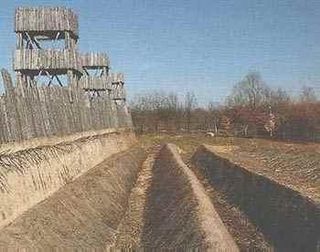
Investment is the military process of surrounding an enemy fort with armed forces to prevent entry or escape. It serves both to cut communications with the outside world and to prevent supplies and reinforcements from being introduced.

Sapping is a term used in siege operations to describe the digging of a covered trench to approach a besieged place without danger from the enemy's fire. The purpose of the sap is usually to advance a besieging army's position towards an attacked fortification. It is excavated by specialised military units, whose members are often called sappers.

Netheravon Airfield is a Ministry of Defence grass strip airfield on Salisbury Plain, in Wiltshire, England. Established in 1913 by the Royal Flying Corps, it became RAF Netheravon from 1918 until 1963, then AAC Netheravon until 2012. Buildings from 1913 and 1914 survive on part of the site. The site forms part of the Tidworth, Netheravon and Bulford (TidNBul) Garrison.

The Experimental Military Unit (EMU) was a joint Australian-American company-sized helicopter assault force which operated during the Vietnam War. The unit was created in 1967 following a request from the United States military for Australia to send more helicopter pilots to the conflict. As the only available personnel were from the Royal Australian Navy (RAN) Fleet Air Arm, the RAN Helicopter Flight Vietnam (RANHFV) was formed and integrated into the 135th Assault Helicopter Company of the United States Army. The EMU unit name was selected by the Americans as a backronym for the Australian bird, a choice which amused the Australians: despite being large, fast, and highly mobile, the emu cannot fly.

The Oxford University Air Squadron, abbreviated Oxford UAS, or OUAS, formed in 1925, is the training unit of the Royal Air Force at the University of Oxford and forms part of the Royal Air Force Volunteer Reserve. OUAS is one of fifteen University Air Squadrons that are spread out across Great Britain and it recruits from the universities at Oxford and Reading University.
Aplekton was a Byzantine term used in the 10th–14th centuries for a fortified army base and later in the Palaiologan period for the obligation of billeting soldiers.

The Battle of Civetot in 1096 brought an end to the People's Crusade, which was a poorly-armed movement of lower-class pilgrims of the First Crusade distinct from the subsequent and much more well-known Princes' Crusade.
Sir Robert Michael Laffan was Irish officer of the Royal Engineers, politician, and governor of Bermuda.
References
- ↑
 This article incorporates text from a publication now in the public domain : Chambers, Ephraim, ed. (1728). "Flying camp". Cyclopædia, or an Universal Dictionary of Arts and Sciences (1st ed.). James and John Knapton, et al.
This article incorporates text from a publication now in the public domain : Chambers, Ephraim, ed. (1728). "Flying camp". Cyclopædia, or an Universal Dictionary of Arts and Sciences (1st ed.). James and John Knapton, et al. - ↑ "Camp". Oxford English Dictionary. Oxford University Press. 2nd edition. 1989.